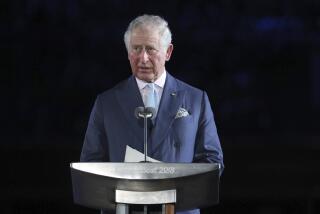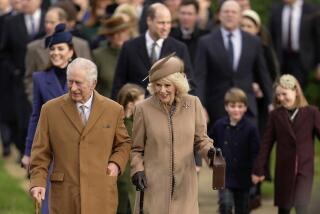Profile : Spain’s Celebrity Prince Just Wants a Little Respect : The first son and future successor to King Juan Carlos I is boning up on statesman’s skills. With an eye on the crown, he’s preparing to lead his nation into the 21st Century.
- Share via
MADRID — As a jet pilot, law student, Olympic sailor and heir to the throne, 24-year-old Prince Felipe of Spain gets a lot of attention. He’d settle instead for a little respect.
“Although I think people are pretty clear about the differences between my role and that of a rock star, I hope I show it in my daily work,” Felipe told Spanish reporters.
In many ways, this is the year, amid nationwide celebrations marking the 500th anniversary of Columbus, when both Felipe and an increasingly self-confident Spain come of age.
The young prince symbolizes the proud tradition and maturing potential of a country marching toward the next century as a full partner in the new Europe. Felipe represents that new generation of Spaniards who will be reaching for the levers of power as the century turns.
When the occasion requires, Felipe is a dutifully ceremonial royal: He cuts a nice ribbon and wields a mean inaugural shovel. Tellingly, though, Spain’s future king is beginning to use his position as a pulpit, speaking out for stronger environmental protection, attacking racism, lauding steps toward a unified Europe and acknowledging social problems such as high unemployment among young Spaniards.
“He understands that his generation is the future; that everything that affects his generation affects him,” said Clara Isabel de Bustos, who covers the royal household for the conservative Madrid daily ABC.
Most Americans will get their first look at the future king on July 25 at the opening ceremonies of the Summer Olympics in Barcelona. Look for the tall, gangly sailor carrying the red and gold Spanish flag in the entrance parade.
Felipe is still cloaked by the shadow of his father, 54-year-old King Juan Carlos I. But he is beginning to assume a higher profile in domestic and international affairs--meeting Cabinet ministers, hosting visiting dignitaries, venturing abroad for forays into informal diplomacy.
Predictably, the 6-foot-5 blue-eyed prince is also a familiar cover boy on Spanish gossip magazines riveted by his yes-and-no romance with Isabel Sartorius, a beautiful and decidedly independent 27-year-old alumna of Washington’s Georgetown University who has since been taking graduate courses in international affairs here.
“I don’t feel obliged to look for a wife among the European nobility,” he told Spanish reporters. “I will marry for love.” Felipe and Isabel reportedly broke up last fall, but magazines breathlessly report secret rendezvous and wonder: Do embers still glow?
As heir to the Spanish throne, Felipe has lived a life of unflagging public scrutiny, yet he is careful about the image he projects. Like most young Spaniards, he sometimes stays out with friends until the wee hours. But he eschews a playboy lifestyle.
“He works a lot, he works hard, he works well,” said Elias Diaz, one of the prince’s instructors at the Madrid Autonomous University, where he is pursuing a degree in law and economics.
The student prince is also a crewman on Spain’s Olympic sailing team. Royal duties have caused him to miss more practices than his coach would like, but Felipe holds his own in international regattas.
“He has a lot of discipline because he has to do a lot more than the normal person,” said Paul Maes, Felipe’s Olympic coach.
Still a rookie public speaker, the boyish-looking prince reportedly reads and rereads the speeches prepared for him, scribbling in modifications, determined to deliver them effectively.
Late last year, Felipe represented Spain on an official tour of South America, made in connection with Spain’s 500th anniversary fiesta.
Facing politically sensitive listeners, the prince was perceived as well informed. Spain and its monarch had been well represented; Felipe had passed a test.
It was only the latest of many challenges set by the king, whom Felipe emulates even to the point of wearing his watch--as his father does--on his right wrist.
The king wanted Felipe to learn English, the language in which Spain usually conducts diplomacy and international business. After a year in a rural Canadian boarding school Felipe was fluent.
Carlos insisted that his son acquire some military polish: One day, he will be nominal commander in chief of the Spanish armed forces. Spending time at all three national military academies, Felipe attained the ranks of infantry lieutenant, navy ensign and--earning his pilot’s wings--air force lieutenant.
That Felipe is very much his father’s son pleases most Spaniards. Not many years ago, King Juan Carlos was viewed suspiciously by Spanish democrats.
Many felt that the king, brought up since the age of 10 under the tutelage of dictator Francisco Franco, would hamper Spain’s transition to democracy after Franco’s death in 1975.
Quite the contrary. The king is now credited with helping to consolidate democracy, in part by deftly short-circuiting an abortive 1981 military coup in which plotters falsely claimed to have his support.
Today the king is widely considered a powerful unifying force in a nation with strong regional loyalties, a head of state who represents Spain’s honor and nationhood in a way no politician could.
Felipe’s own popularity is more certain than the role he will one day play in Spain.
Many Spanish conservatives believe that the monarchy’s role will be even more important in an era of disappearing European borders--that, in the future, the king will be even more central to Spain’s national identity.
Some Spanish intellectuals argue, by contrast, that the monarchy will have become almost purely symbolic by the time Felipe ascends to the throne--most likely in the next century.
For his part, Felipe sails ahead, increasingly in the national limelight, a king in formation. He may mature as a figure of ceremony, as a figure of substance, or both. But in any event, he will bulk large in the Spanish future.
Next in Line for the Throne
Spain is a constitutional monarchy, with the king acting as head of state and commander in chief of the armed forces.
Here is the order of succession to the Spanish crown, as established by country’s 1978 constitution:
* Crown Prince Felipe Juan Pablo Alfonso de Todos los Santos Borbon Schleswig-Holstein Borbon Sonderburg Glucksburg. Only son of King Juan Carlos I. Born Jan. 20, 1968, in Madrid. Also holds the title Prince of Asturias.
* Princess Elena. Eldest daughter. Born Dec. 20, 1963.
* Princess Christina. Second daughter. Born June 13, 1965.
Tracing Spain’s Royal Heritage
* The scattered peoples of the Iberian Peninsula were first united under the Christian Visigoths in the early 7th Century, only to be conquered by the spreading Muslim empire in the 8th Century.
* By the late 13th Century, the Christian kingdoms of Castile and Aragon had reconquered most of the Muslim-controlled territory. The two kingdoms were united in 1479 with the marriage of Ferdinand II of Aragon and Isabella I of Castile. The last of the Moorish (Muslim) kingdoms, Granada, was reconquered in 1492.
* Charles I of the Hapsburg ruling family succeeded Ferdinand as king and was subsequently elected Holy Roman emperor. He abdicated his claims to Spain and was succeeded by his son Philip II, a vindictive religious fanatic who entangled Spain in a variety of costly wars.
* Following three weak Hapsburg kings, the first Bourbon king, Philip V, took the throne in 1700, sparking the War of the Spanish Succession (1701-1714), which resulted in the loss of external territories such as Belgium, Luxembourg and Sardinia.
* Napolean Bonaparte installed his brother Joseph as king of Spain in 1808. British and Spanish forces restored the Bourbon crown in 1814.
* Spain became a republic in 1931, when King Alfonso XIII abdicated in the wake of overwhelming public support for republicanism.
* A bloody civil war between Republicans and Nationalists broke out in 1936. General Francisco Franco’s Nationalists, with the backing of Nazi Germany and Fascist Italy, achieved victory in 1939. Franco became head of state and remained as such for more than three decades.
* The monarchy was restored in 1975 when Juan Carlos I became king following Franco’s death. King Juan Carlos has embarked on a program of democratic political and economic reforms and has helped Spain move away from relative isolation toward integration in a modern and united Europe.
Sources: Constitution of Spain; Spanish Embassy, Washington D.C., and Encyclopaedia Britannica
More to Read
Sign up for Essential California
The most important California stories and recommendations in your inbox every morning.
You may occasionally receive promotional content from the Los Angeles Times.













